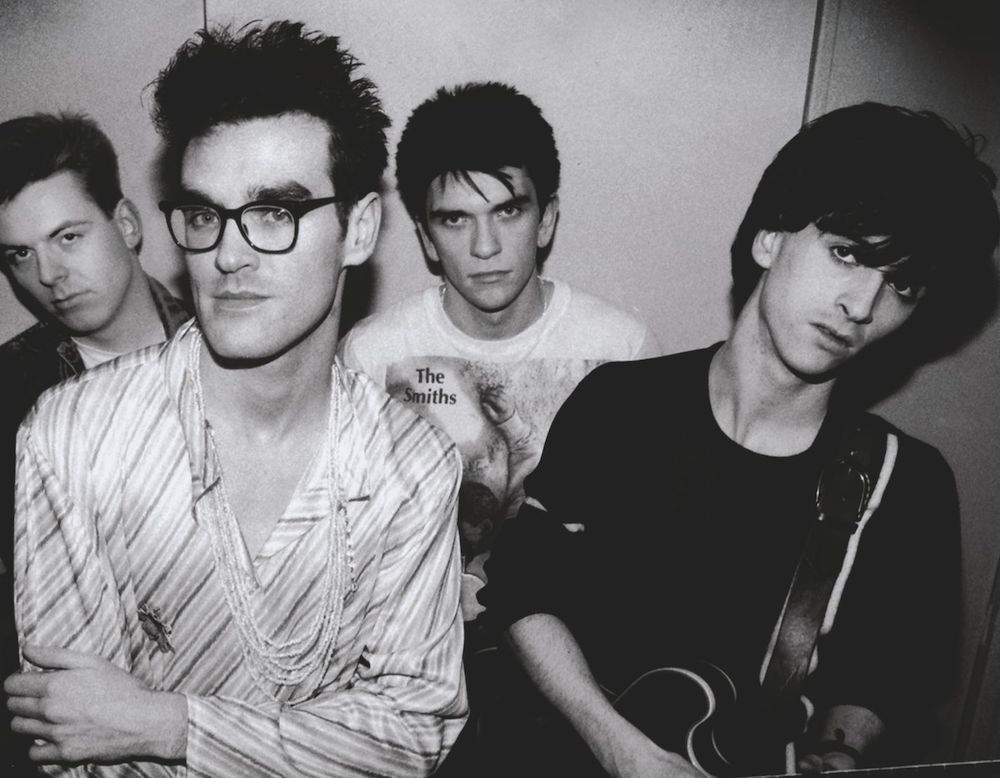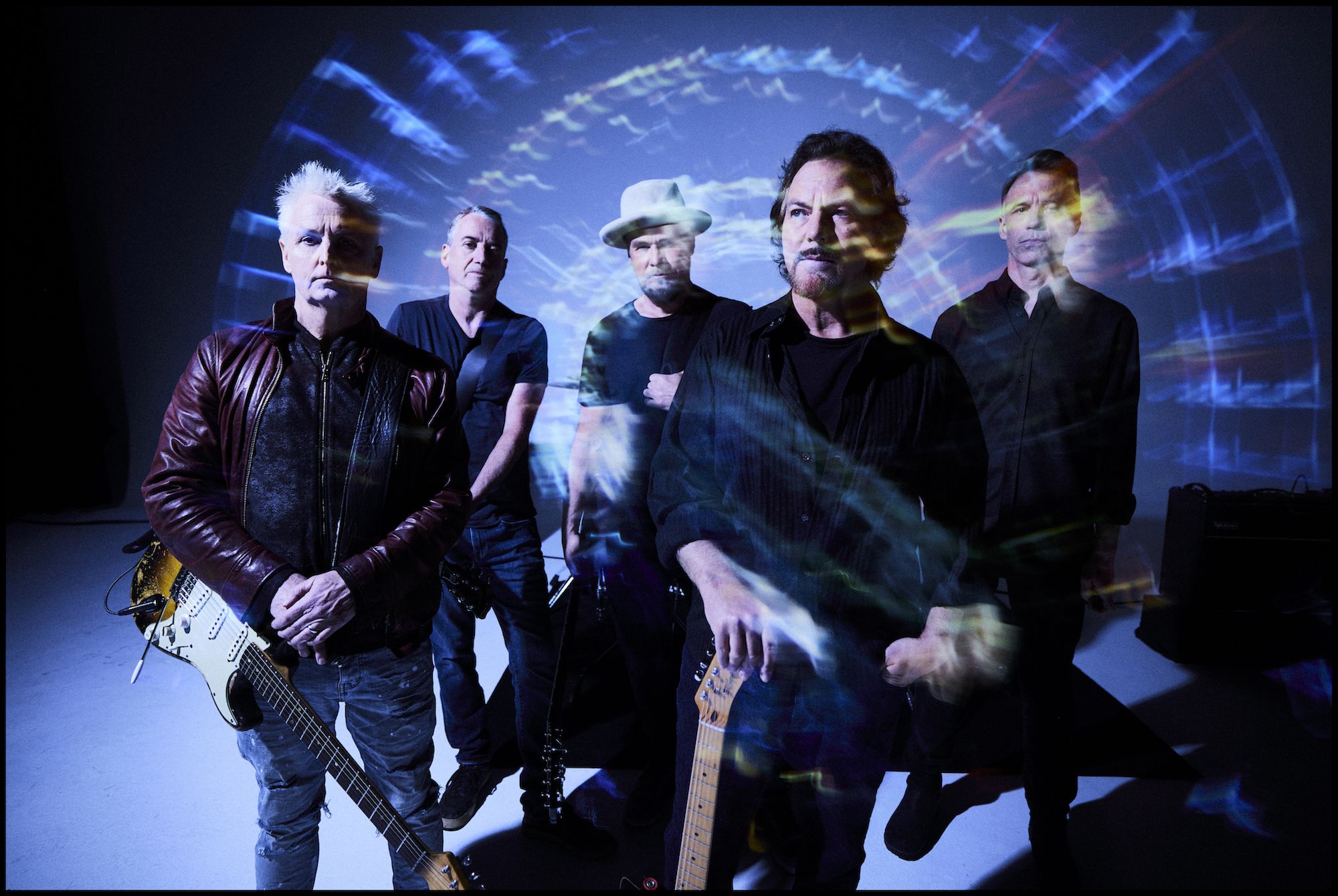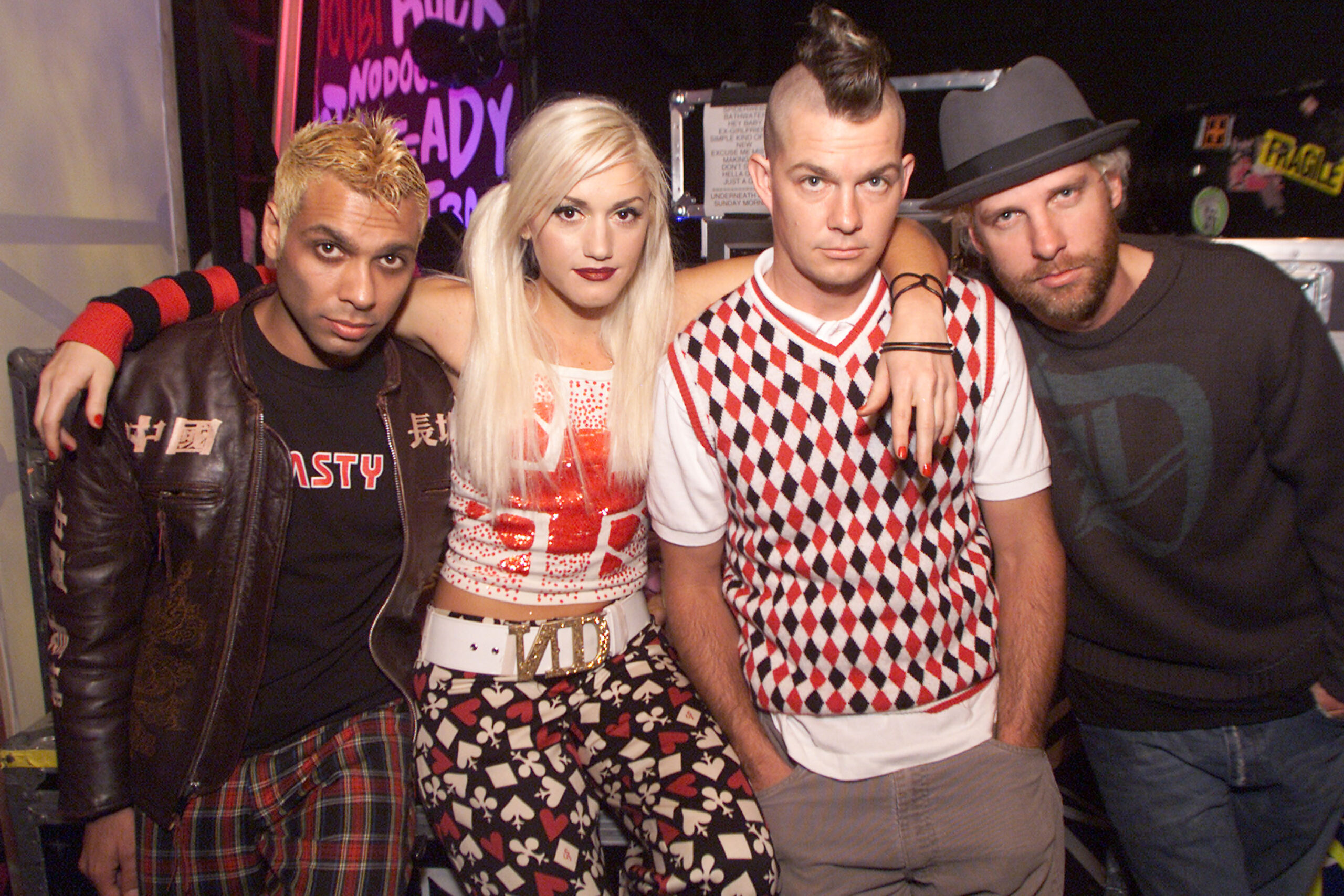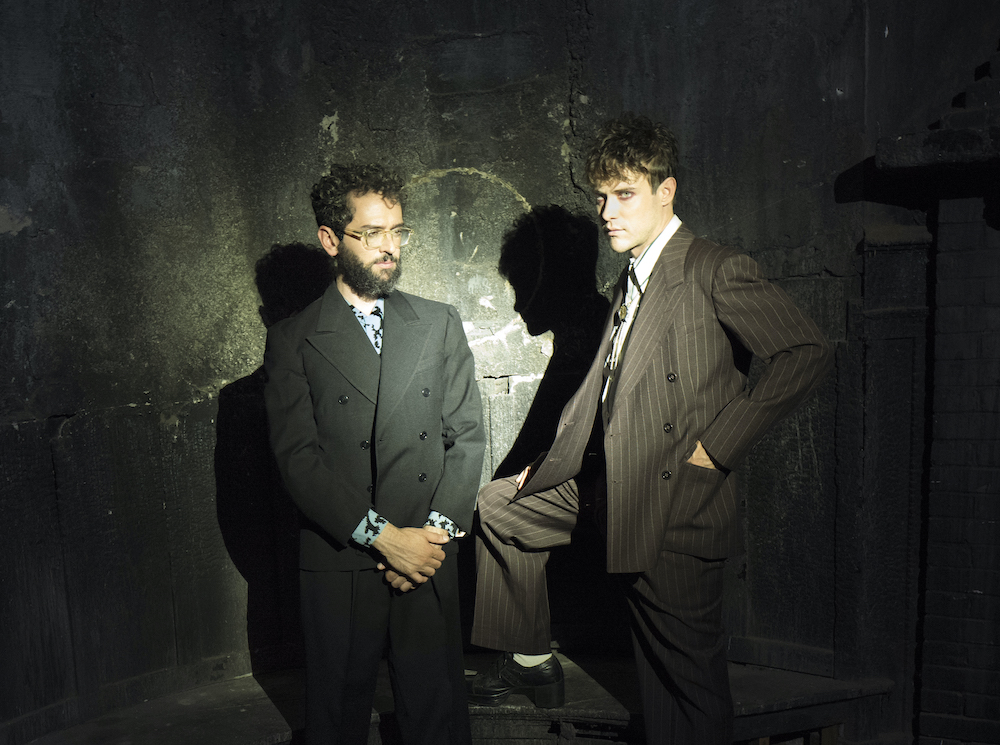You may not recognize Mark Ronson, but you'd definitely recognize at least one of the countless hits he's worked on in the past 10 years. He began as a socialite DJ back in the '90s, a New York cool kid who went from spinning at hip-hop clubs to high-fashion parties. Born in London in 1975, Ronson moved to NYC in the early '80s, and his catalog celebrates the city that was rebuilding itself from ruins, inspired by disco and hip-hop.
Ronson got involved with the music industry at a very early age, interning at Rolling Stone when he was just 12 years old. He was around a lot of instruments and music equipment as a kid since his mother Ann Dexter-Jones married Foreigner's Mick Jones after divorcing real estate mogul Laurence Ronson. As a boy, Ronson was nicknamed "the sponge" because of his eagerness to learn about all kinds of music. It's this insatiable thirst that has allowed him to evolve from one album to the next, releasing music under his own name while rarely actually singing on anything.
As a young music nerd in love with hip-hop and the science of sampling, Ronson pursued music behind the scenes after attempting to go to college. He's worked with rappers ranging from Q-Tip to Nate Dogg to Sean Paul and some of recent memory's most iconic vocalists, including Amy Winehouse, Adele, and Lady Gaga. Throughout his career, Ronson has proved to be a master mold-maker, casting his collaborators to suit his vision. He draws inspiration from the past, particularly the eclectic musical landscape of 1970s New York. But his historical reverence isn't limited to just one decade; "Electricity," his and Diplo's recent Silk City single with Dua Lipa, looks back at the summer '03 blackout with rose-colored glasses.
[articleembed id="2047825" title="Late Night Feelings" image="2047885" excerpt="Read our review of Mark Ronson's great new album."]
Ronson broke out working with then-unknown artists like Allen and Winehouse, and he continues to produce music for emerging talent today with the likes of Brooklyn’s witty, sensual singer King Princess and Arkansas' affecting gospel singer YEBBA. It seems as though his work with these artists is a bargain deal; after he helps them with their albums they contribute their voices to his.
Ronson doesn’t have the Midas touch, and pop perfection doesn’t materialize for him out of nowhere. He has proven himself to be total a perfectionist. It took six months for him to complete "Uptown Funk," which reached the status of inescapable asphyxiant as most number one hits do. Ironically the infectious pop track caused him much pain. According to The Guardian, he worked so hard on the hit "that his hair started to fall out; at one point, the stress of trying to come up with a suitable guitar part caused him to vomit and faint."
When listening back to records in the studio, whether to admire or critique them, Ronson has considered this "exquisite torture." Experimenting with this dichotomous relationship of ecstasy and agony, his recent Late Night Feelings is his best and, according to Ronson, his most honest. The recently divorced 43-year-old channeled his sorrow into a heartbreak prism, showcasing its various shades. Where his first album primarily featured rap artists, Ronson has graduated to a modern-day Giorgio Moroder, using female singers and a disco-lit backdrop where sadness gets a glamorous close-up.
It’s easy to label Mark Ronson as a retro-revivalist. In interviews it seems that this title frustrates him, like he's the latest festival fashion trend -- a human flower crown -- that capitalizes on nostalgia. But most of his references, from Britney Spears to Pierre Bachelet, further reveal his passion for a period when vinyl was the main way of hearing sound and search engines were far from anyone’s imagination. Ronson is the type of person that finds significance in bringing back an old-school approach. There's a thrill in restyling old sounds like trying on used clothes at a thrift store. He might use a sample or a drumbeat that was really popular in another era, but each hit he contributes to has its own unique, refreshing euphoria.
This is part of what is great about Ronson's career. In his TED Talk, he optimistically discusses how artists co-opt sound. As Owen Meyers pointed out in his thoughtful piece on Late Night Feelings, Ronson's terminology when describing how he manipulates sound is, at times, unfortunate. But Ronson feels that there's a respectful way of taking something artists love and "build from it." He further explains that "you can't just hijack nostalgia wholesale. It leaves the listener feeling sickly." With each passing year, the legality of sampling becomes more complicated and copyright infringement lawsuits against major pop songs multiply. (The late '70s groups the Sequence, the Gap Band, and Collage have all claimed that "Uptown Funk" was a derivative of their past songs. After winning their lawsuit for similarities to their song "Oops Upside Your Head," the five members of Gap Band were added to the ever-evolving "Uptown Funk" writing credits.)
Ronson's anonymity to the public, yet widely known name in the industry is the perfect kind of reputation for making this vintage vibe thrive. His growing list of collaborators over the past couple decades has allowed him to add that nostalgic sparkle to artists of all ages. Some of his recent behind-the-scenes credits include Winehouse's "Rehab," Lady Gaga and Bradley Cooper's "Shallow" from A Star Is Born, and "This Life" from Vampire Weekend's Father Of The Bride. That being said, the following list is based on music where Ronson or one of his groups are credited as a performing artist. Despite his endless work writing and producing for other acts, we’re ranking the work he’s distributed with his own name at center stage.
10. "Ooh Wee" (from Here Comes The Fuzz, 2003)
The single from Ronson's debut Here Comes The Fuzz has all his quintessential retro charms. He enlisted Ghostface Killah and protege Trife plus Nate Dogg and Saigon to rap over the groovy and opulent instrumentation. Although Ronson seems like the type to relish the patient sport of crate-digging, he found the main sample "Sunny" by Boney M from watching Paul Thomas Anderson’s Boogie Nights. Ronson's revamped Version features jazzy, shifting percussion and sputtering glass clinking. "Ooh Wee" somewhat recalls the ultimate sampled track, "Apache" by the Incredible Bongo Band, with similar verve and bounce.
9. "Just" (from Version, 2007)
Version contained some of Ronson’s best and most experimental recreations of both modern and older tracks. When he decided to take on Radiohead’s "Just," from their sophomore album The Bends, he made the perfect choice of recruiting Phantom Planet’s Alex Greenwald. His vocals are haunting and groggy like a ghost that just woke up from a nap while twangy guitar strums orbit around the bossy brass calls of trumpets and trombones. Ronson serves up a saucier Version of Radiohead.
8. "Electricity" (2018)
Diplo and Mark Ronson fall on opposite ends of the producing spectrum. Diplo is more interested in electronic music, whereas Ronson prefers an analog, old-school approach to producing. Diplo loves not wearing a shirt and Ronson prefers a nice, tailored suit. They are the yin to the other’s yang, and together they are Silk City, named after the venue where they first met in 2003. They've only released a few songs, but their best features the sumptuous voice of English crooner Dua Lipa. Evoking Rihanna's "We Found Love," she sings about immense, uncontainable romance over forceful piano chords and propulsive tempo.
7. "Oh My God" (from Version, 2007)
Many moons ago, Lily Allen met Mark Ronson at Notting Hill Arts Club's YoYo party and gave him a CD of demos. A few months later, he was helping her out with her debut album Alright, Still -- together they created one of my all-time favorite songs, "Littlest Things." In return, Allen contributed a song for Ronson's covers collection Version a year later. Ronson paired her with his reworking of the debut single from the Leeds quintet Kaiser Chiefs. Her tone is playful, cut with undertones of irreverence and arrogance. I couldn’t think of anyone better than Allen to sing the line: "I’ll come back stronger than a powered up Pac-Man."
6. "Daffodils" (from Uptown Special, 2015)
Ronson asked Pulitzer-winning author Michael Chabon to write lyrics for 2015's Uptown Special. Instead of inhabiting the mind of a fictional character, Chabon imagined what it would be like to be Joni Mitchell or even Katy Perry. Ronson's good pal, the reputable producer and Tame Impala frontman Kevin Parker, sings Chabon’s enigmatic lyrics on the highlight "Daffodils."
Parker's holographic vocals bring the psychedelic images to life against the smooth-riding R&B background. He opens with a T.S. Eliot reference that anthropomorphizes the sky. Throughout the song there are psychotropic images and William Burroughs-like language. I can’t tell you specifically what "Crank that vapor-wagon/ Start that kick dragon beating" means, but I have a pretty good idea that it is about tripping balls! Also, this song has one of the best, catchiest industrial bangs [00:56] I’ve ever heard. It’s easy to imagine one of the seven dwarves, most likely Dopey, snatching one of those daffodils while working and clocking his little axe on the dance floor.
5. "Find U Again" (from Late Night Feelings, 2019)
It’s fitting that Late Night Feelings, which has been repeatedly dubbed the album of sad bangers, has a song that makes going to therapy twice a week due to heartbreak sound cool. On "Find U Again," love-induced pain devours any sense of hope and captures restless desire after a breakup. Ronson confided in Camila Cabello, who he recently dubbed "Our First Lady Of Emo Pop," to make sure the deliverance of romantic desperation was perfect.
The two make a great pair for reveling in heartache. Synth chords radiate like light reflected in a precious gemstone. Guitar lines shutter back and forth like headlights blinking in the night. This track has so many excellent lines from "there’s a you-shaped space in my bed/Always you-shaped thoughts inside my head" to "this crush is kind of crushing me." It’s easy to imagine Cabello melancholically driving down La Cienega into the twilight chasing the ghost of her lost love.
4. "Bang Bang Bang" (from Record Collection, 2010)
One of Ronson’s most ambitiously successful and strange feats was turning a French children's song into a hit. After his foray into funkified modern classics, he did a quick costume change into French new wave for 2010’s Record Collection. He brought out the sexier older sibling of "Alouette" with the help of longtime collaborator Q-Tip and producer Amanda Warner aka MNDR.
"Bang Bang Bang" is a prime example of Ronson giving an old car a fresh paint job with a crisp and classic finish. It's glorious ‘80s synth pop, embodying the glamour of champagne fountains and "40K contracts." But at the heart of the song is something a little more sinister. I mean, you can’t flip a classic kids' song without being slightly subversive. Warner and Tip warn of an omnipresent darkness, maybe institutional oppression or hegemonic control. "There's a rumor goin' 'round 'bout the suits runnin' town/ If you look into the sky, dead birds fly high, high, high," the Abstract raps. "You're logging hours and don't see the big picture/ Over your shoulder, you'll get no last words," Warner sings in a hypnotically posh, yet slightly robotic voice.
3. "Valerie" (from Version, 2007)
When I discovered that this song was a cover, I thought it was from the '60s or '70s, a forgotten ballad or an unearthed gem from one of Ronson’s crate-foraging days. Instead, "Valerie" was originally released in 2006 by an indie rock band from Liverpool called the Zutons.
The song is about a friend who got caught drunk driving, and when Ronson first heard it, he was surprised that Winehouse wanted to sing it. But she heard something in the chords that he didn't. The finished product is a rendition with uncompromising swing waiting for anyone to break out into the jitterbug. Strings cushion Winehouse’s voice as she laments over a ginger-haired woman. Her vocals are like crushed velvet, rich and textured, never striving for perfection but achieving it all the same.
2. "Uptown Funk" (from Uptown Special, 2015)
As noted above, Ronson labored over "Uptown Funk." At times, he became physically ill because of this track. It paid off; the song went on to become his first and only #1 hit in the USA and the UK.
If you were alive in 2015, you’ve heard "Uptown Funk." When Ronson played it for his stepdad -- former Foreigner guitarist Mick Jones -- he thought it was a Nile Rodgers track. For better or for worse, the result of his labor was a song that, in his words, was so good "people don’t actually think it’s [him]." The song is an ode to glittered, coke-dusted '80s funk and a love letter to the sequined bravado of true showmanship. Bruno Mars' vocals strut across Ronson's guitar riffs with intoxicating swagger. With lines like "I’m too hot/ Make a dragon wanna retire, man," this song doesn’t care what you think: It’s the hit that will make you dance whether you’re tired of it or not.
It isn't a fluke that the two are a match made in heaven from a bygone era. Ronson worked on the Police-inspired "Locked Out Of Heaven" from Mars' Grammy-nominated sophomore album Unorthodox Jukebox. Three years later, "Uptown Funk" won the Grammy, and it propelled both Mars and Ronson into the stratosphere of fame, so much so that one might have worried if either would ever have as big of a hit. Bruno Mars would go on to win Album Of The Year for 24K Magic, and a year after that Ronson won two Grammys -- one for A Star Is Born's "Shallow" (which also took home an Oscar) and one for his work with Diplo and Dua Lipa on the aforementioned "Electricity."
1. "True Blue" (from Late Night Feelings, 2019)
On "True Blue," Angel Olsen sounds like she’s under a spell. Her collaboration with Ronson for Late Night Feelings is tragic and dreamy-eyed, a spectre that vampirically sucked all the romantic desperation from every '80s movie ever. "I love the way you read my eyes," sounds like something scripted soulmates would say. Synthesizers whirl against faint drones as if the tears from both Olsen and Ronson have corroded the vinyl etchings. "I should’ve known it, how the world disappeared/ When you came around," Olsen sings. She sounds tired but determined, letting us know that this burning love is something she will carry with her forever.
"True Blue" is an example of Ronson’s growing curatorial muscle. He has the ability to work with nearly any star he wants, and although being #1 might be on his mind, it isn’t the ultimate goal. Olsen isn’t a Hot 100 darling like Mars or a Grammy-winning powerhouse like Winehouse. Her catalogue has transitioned from affecting folk music to introspective takes on early rock 'n' roll. Their collaboration is a surprise only because of Ronson's history with largely known pop artists, but it isn’t a surprise that their final product is a poignant, wistful success. The two old souls work off one another brilliantly; Olsen’s sorrowful belts collide against Ronson’s temperate bass riff and guitar wails. It’s a match made in heartbreak heaven.






